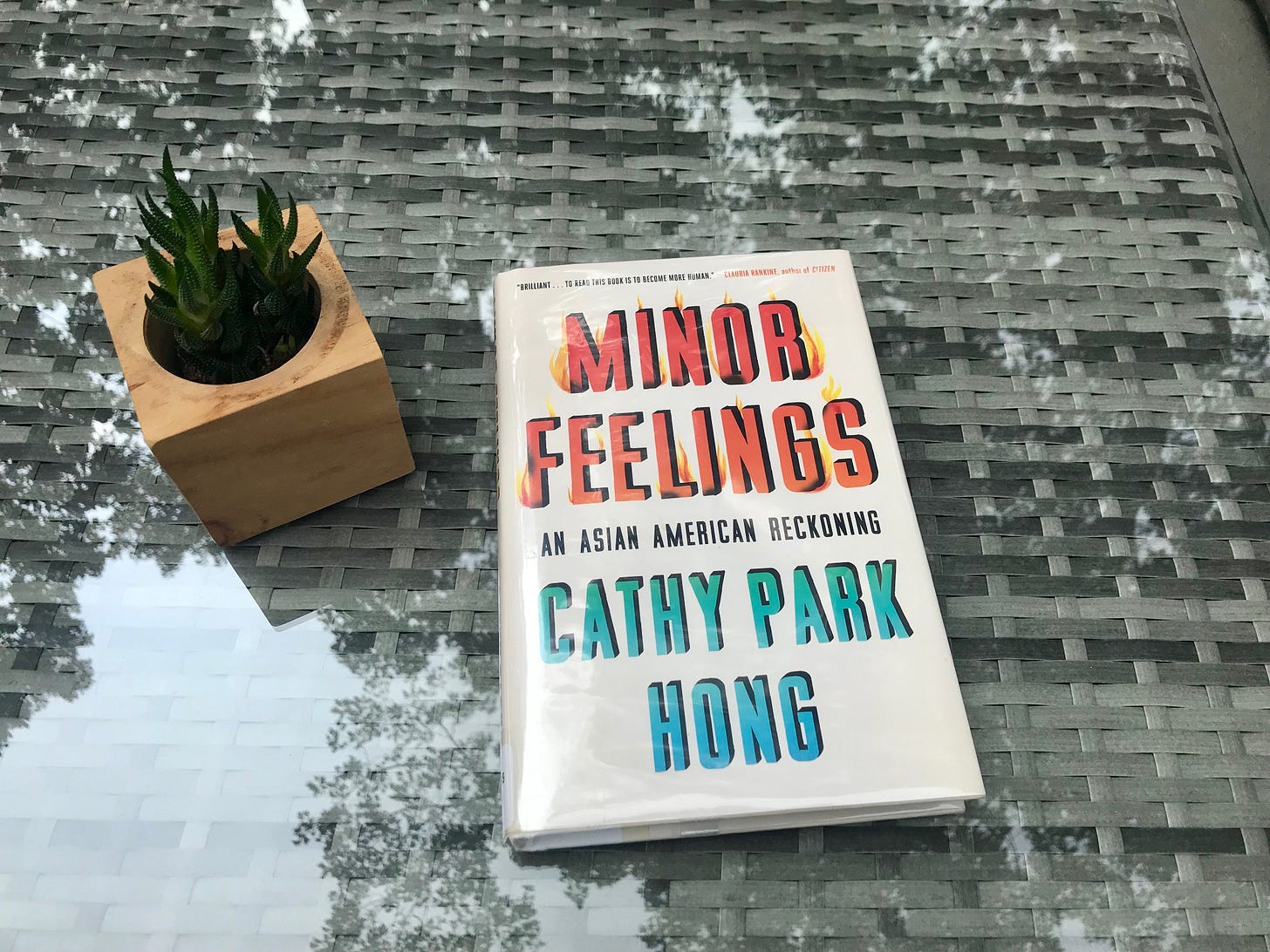Immigrant Strong: September Issue
Multilingualism wounds, losing your first language, and being Muslim and Arab American
Book
Cathy Park Hong’s Minor Feelings: An Asian American Reckoning is a necessary read and one that should be included in a long list of books that can expand our understanding of racial identity and racial consciousness in America. Hong, the daughter of Korean immigrants who is a poet and an essayist, skillfully combines memoir and cultural criticism in this well-researched and introspective essay collection.
Essays
If you’ve been reading this newsletter, you know I’m often talking about bilingualism and multilingualism and how immigrants and refugees live within their worlds of multiple languages. I found this LitHub essay by Sulaiman Addonia so stunningly beautiful—one of the best I’ve read on this topic. Here is The Wound of Multilingualism: On Surrendering the Languages of Home. After reading it, I immediately added his novel, Silence Is My Mother Tongue, out this month, to my Goodreads list.
“The losses and gains of father and mother tongues planted the idea of language’s wonders and wounds in my young mind. Arabic was like a necklace of white pearls around my neck, its foreignness and temporariness so visible on my skin. I feared that I would lose it in the way I had lost my mother’s language and never mastered my father’s.”
Sticking to the same theme, here is Hasanthika Sirisena’s powerful graphic essay in Electric Literature, What It’s Like to Lose Your First Language.
“The language belongs now to a person I might have been.”
I liked this LitHub summary of a conversation between Jhumpa Lahiri, Eduardo Halfon, and Ilan Stavans, Three Authors Leave, Stay, Dream, and Long for Elsewhere. These immigrant writers discuss their responses to COVID; here is one passage, by Halfon, that especially resonated with me:
“Although I’ve lived in the US almost half of my life, I have always seen the country as an outsider. I never became an insider, never became a citizen (I was always there with some type of visa), never felt like an American, although I could pretend to be one. But when I’m in Guatemala I feel the same. Likewise in Spain. Likewise here in France. I’m never completely at home anywhere.”
I’ve recommended Laila Lalami’s work several times in this newsletter and look forward to reading her new book, Conditional Citizens: On Belonging in America, which was just published yesterday. To get a taste of the book, here is an adapted piece in The New York Times Magazine, I’m a Muslim and Arab American. Will I Ever Be an Equal Citizen? It was one of those pieces that left me struggling to pick just one quote from it.
“But even under the best of circumstances, immigration is a traumatic experience that cuts a person’s life in two: There is the life before and the life after.”
This New Yorker essay by Jiayang Fan, How My Mother and I Became Chinese Propaganda, is a lengthy one but worth your time.
“For what is an immigrant but a mind mired in contradictions and doublings, stranded in unresolved splits of the self? Sometimes I have wondered if these people knew something about Jiayang Fan that had always eluded me. For them, there is not an ounce of doubt, whereas uncertainty is the country where I most belong.”
Shirley Wang penned this nice piece about being Chinese American, the Korean dish she enjoys, and the concept of Asian identity for Catapult, Wherever I Go, Kimchi Fried Rice Feels Like Home.
“Being “generally Asian” led me towards kinship with Asians in public and at the restaurant; it brought me closer to other waitresses—the patrons’ inability to distinguish between us, inextricably intertwining the stories of our diasporas. But it didn’t give me a sense of self. ”
I’ll wrap things up with this Popula essay by Nushin Rashidian, The Next Day There Were No Onions.
“America’s will led, in part, to why I was born here and not there, why so many families left there, why so many people can’t or won’t go back there, why there no longer feels like home.”
Virtual Events
At 5:30 pm ET today, the Toronto Palestine Film Festival will be talking to Zaina Arafat, the author of You Exist Too Much.
If you liked Laila Lalami’s essay, check out her upcoming online readings — the first one is tonight!
About this newsletter: Writing about immigrant and refugee life—the struggles, triumphs and quirks—by immigrants and refugees, and children of immigrants and refugees. Photo in the logo: Miguel Bruna/Unsplash.
About me: I grew up in the former Yugoslavia, then moved to Canada, and now live in the United States, where I work as a writer and communications consultant for nonprofits focusing on human rights. I have written about my immigrant experience for The New York Times, Catapult, the Washington Post and the New York Daily News. Find me on twitter, @vesnajaksic, or on my website, www.vesnajaksic.com.




